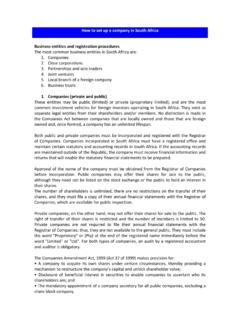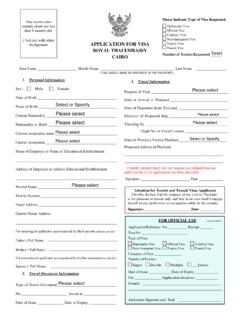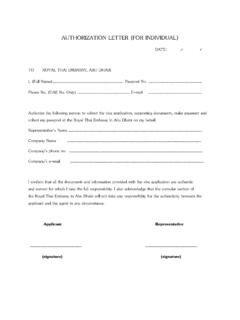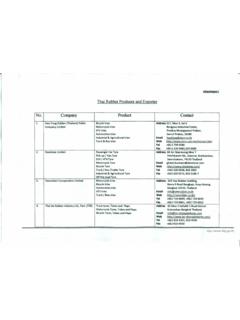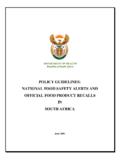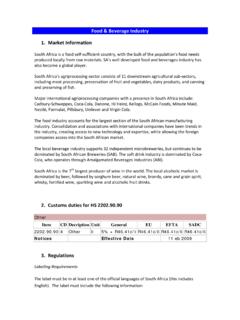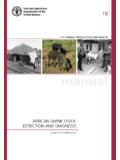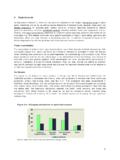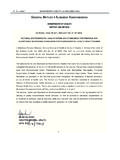Transcription of South African Import procedures for food products
1 1 South African Import procedures for food products GENERAL OVERVIEW As South Africa has a very strong Agricultural sector, the South African Government has certain rules, regulations and laws with regards to the importation of Agricultural products to South Africa. These rules, regulations and laws are in place to ensure that no alien pests and diseases enter the country, which could damage the local industry. Furthermore these regulations aim to ensure the quality and safety of the products imported to South Africa. There are mainly three Government Departments regulating agricultural imports, namely: 1.
2 The National Regulator for Compulsory Specifications (NRCS) (Main Website: ) Click on food on the left menu Tel: +27 (0)21 526 3400 (Head Office) Fax: +27 (0)21 526 3450 Senior Manager (Email): Principal Inspector (Email): Subject Specialist (Email): Other involved parties: Department of Trade and Industry Web: ) Tel: +27 12 394 9500 Marine & Coastal Management Tel: +27 21 402 3564 Fax: +27 21 419 6942 Email: Web: 2. The South African Department of Agriculture, Forestry and Fisheries (DAFF); (Website: ) Tel: +27 12 319 6000(Head Office) Fax: +27 12 319 0000 3. The South African Department of Health (DOH); (Website: ) Tel: +27 12 312 0945 (Regulatory Services) Fax: +27 12 325 5706 2 1.
3 The National Regulator for Compulsory Specifications (NRCS) is mainly involved with quality control over fish and fish products , and canned & processed meat products . Rules & Regulations on imports The manufacture and Import of fish and fish products is strictly controlled by the National Regulator for Compulsory Specifications (NCRS) who manages the industry through three compulsory standard specifications. The Compulsory Specification for frozen fish, frozen marine molluscs and frozen products derived therefrom (Government Notice NoR530 of 14 May 1999) came into effect on 14 July 1999 and replaced the previous specification (Government Notice No R35 of 12 January 1973).
4 The specification covers the requirements for the handling, preparation, processing, packaging, freezing, storage and quality of frozen fish, frozen marine molluscs, frozen fish products and frozen marine molluscs products intended for human consumption. It also covers requirements for factories and employees involved in production. The Compulsory Specification for Frozen shrimps (prawns), langoustines and crabs (Government Notice No 326 of 20 February 1987) covers the requirements for hygienic harvesting, preparation, processing and conveyance of shrimps, langoustines and crabs whether frozen at sea or on shore.
5 The specification also includes the requirements for raw materials and final product , including its packaging and storage. The Compulsory Standard Specification for the manufacture, production, processing and treatment of canned fish, canned fish products and canned marine molluscs (Government Notice No. R358 of 10 March 1972) governs the manufacture of canned product . In addition to the standards requirements, the sector is regulated by the Department of Trade and Industry and Marine & Coastal Management. Additional charges on imports Value added tax of 14% is payable on all imports. VAT is levied on the value for customs duty plus 10% plus any additional duties paid.
6 Preferential treatment in respect of imports Crustaceans of Mozambican origin qualify for preferential treatment in terms of the trade agreement with South Africa. Such preferences are subject to quotas. Goods of Malawian origin are admitted to South Africa free of duty in terms of the trade agreement with South Africa. Imports from fellow member states of the South African Customs Union (SACU) are admitted free of duty. Import licensing Fish and crustaceans, fresh, chilled and frozen (HS 0302, 0303, 0304, 0305, 0306, 0307) require an Import permit issued by the Import Control Unit of the Department of Trade and Industry.
7 Import licenses are valid only for the calendar year in which they are issued. In other words, a license obtained in August 2008 is only valid until December 2008, at which stage it must be renewed for 2009. The license is only valid in respect of the goods of the class and country specified. It is non transferrable and may only be used by the person to whom it was issued. Imports of fish and crustaceans, fresh, chilled and frozen (HS 0302, 0303, 0304, 0305, 0306, 0307) require a permit from the Department of Sea Fisheries. The application for a permit must be accompanied by a letter from the country of origin to indicate that the collection and export of the specimens are approved.
8 The large South African importers obtain an annual Import permit from Marine and Coastal Management. Crustaceans and molluscs of tariff code 0306 and 0307 require a permit from the Directorate of Plant Health and Quality in terms of the provisions of the Agricultural Pests Act of 1983 (Act No 36 of 1983). General Documentary Requirements The following general documents are required for imports into South Africa: Pro forma invoice Packing declaration Transport documentation Bill of Lading Air Waybill Freight Transit Order Insurance documents Customs documents Import permit Special certificates/permits Bill of entry Payment documents Commercial invoice 4 Certificate of origin (DA 59) Packing list Import procedures The Port Health Officer is required to inspect all imported Fish and fish products at the port of entry into South Africa.
9 Under the Standards Act of 1993 inspection is compulsory for the importation of: canned fish, canned fish products and canned marine molluscs canned crustaceans frozen fish, frozen marine molluscs and frozen fish and frozen marine mollusc products frozen rock lobster products frozen shrimps (prawns), langoustines and crabs smoked snoek For every shipment of fish or crustaceans entering South Africa the National Regulator for Compulsory Specifications (NCRS) requires to be notified so that a sample can be taken for testing. The size of the sample varies according to the size of the shipment.
10 The sample is inspected for bacteria, odour, uniformity of size, general quality and to ensure that the product has been kept frozen at 20 degrees Celsius. The packaging is also inspected to ensure it meets with the compulsory standard. The inspection normally takes 5 working days. In the interim, the goods will be released under "embargo", also called "Extended Health Detention", to an approved facility. The container may be unpacked, but the goods must be kept intact and separate from other stock. The importer may not use any of the goods until the Port Health Officer has approved the consignment, issued a certificate of compliance and released it without prejudice.
